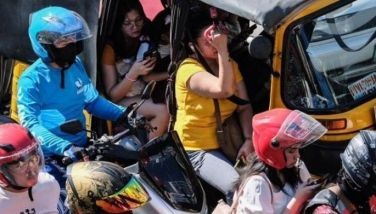SC junks appeals vs gov’t ID plan
July 21, 2006 | 12:00am
The Supreme Court has upheld with finality its April 19 ruling declaring President Arroyo’s Executive Order No. 420 constitutional.
EO 420 will implement a unified multi-purpose identification system for government agencies and government-owned and controlled corporations (GOCCs).
In an en banc resolution dated June 20 but released only yesterday, the SC junked the motions for reconsideration filed by the party-list groups Kilusang Mayo Uno (KMU) and Bayan Muna.
The SC said the KMU and Bayan Muna failed to present substantial arguments to warrant the reversal of the SC’s April 19 ruling.
The KMU and Bayan Muna said EO 420 is unconstitutional because Mrs. Arroyo usurped legislative functions in issuing EO 420 and it infringed on the citizens’ right to privacy.
Voting 12-2, the SC upheld the constitutionality of EO 420. It ruled that it is within the constitutional powers of the President to direct entities under the executive department to adopt a uniform ID data collection and format.
The SC said Article 8, Section 17 of the 1987 Constitution states that the President "shall have control of all executive departments, bureaus and offices."
In upholding the constitutionality of EO 420, the SC said Mrs. Arroyo did not make, alter or repeal any law when she issued EO 420 and that she merely made use of existing laws.
"EO 420 reduces costs, as well as insures efficiency, reliability, compatibility and user-friendliness in the implementation of current ID systems of government entities under existing laws. Thus, EO 420 is simply an executive issuance and not an act of legislation," the SC said.
The SC said EO 420 is limited only to the executive branch of the government and does not apply to the judiciary or to other independent constitutional commissions.
In its April 19 ruling, the SC also noted that the EO limited the information to be collected to 14 specific items, particularly name, home address, sex, picture, signature, date of birth, place of birth, marital status, name of parents, height, weight, two index fingerprints and two thumb marks, any prominent distinguishing features like moles or others and tax identification number.
"These limited and specific data are the usual data required for personal identification by government entities, and even by the private sector. Any one who applies for or renews a driver’s license provides to the (Land Transportation Office) all these 14 specific data," the SC said.
It added that the LTO and some other government offices require even more information.
"Various laws allow several government entities to collect and record data for their ID systems either expressly or impliedly by the nature of the functions of these government entities. Under their existing ID systems, some government entities collect and record more data than what EO 420 allows."
The court even cited itself as an example, pointing out that its employees — including the justices on the bench — have to provide 15 specific data.
Standardizing the government ID system would also offer added benefits for the country in the long term, the SC said.
"These benefits are savings in terms of procurement of equipment and supplies, compatibility in systems as to hardware and software, ease of verification and thus increased reliability of data and the user-friendliness of a single ID format for all government entities," the tribunal said.
EO 420 will implement a unified multi-purpose identification system for government agencies and government-owned and controlled corporations (GOCCs).
In an en banc resolution dated June 20 but released only yesterday, the SC junked the motions for reconsideration filed by the party-list groups Kilusang Mayo Uno (KMU) and Bayan Muna.
The SC said the KMU and Bayan Muna failed to present substantial arguments to warrant the reversal of the SC’s April 19 ruling.
The KMU and Bayan Muna said EO 420 is unconstitutional because Mrs. Arroyo usurped legislative functions in issuing EO 420 and it infringed on the citizens’ right to privacy.
Voting 12-2, the SC upheld the constitutionality of EO 420. It ruled that it is within the constitutional powers of the President to direct entities under the executive department to adopt a uniform ID data collection and format.
The SC said Article 8, Section 17 of the 1987 Constitution states that the President "shall have control of all executive departments, bureaus and offices."
In upholding the constitutionality of EO 420, the SC said Mrs. Arroyo did not make, alter or repeal any law when she issued EO 420 and that she merely made use of existing laws.
"EO 420 reduces costs, as well as insures efficiency, reliability, compatibility and user-friendliness in the implementation of current ID systems of government entities under existing laws. Thus, EO 420 is simply an executive issuance and not an act of legislation," the SC said.
The SC said EO 420 is limited only to the executive branch of the government and does not apply to the judiciary or to other independent constitutional commissions.
In its April 19 ruling, the SC also noted that the EO limited the information to be collected to 14 specific items, particularly name, home address, sex, picture, signature, date of birth, place of birth, marital status, name of parents, height, weight, two index fingerprints and two thumb marks, any prominent distinguishing features like moles or others and tax identification number.
"These limited and specific data are the usual data required for personal identification by government entities, and even by the private sector. Any one who applies for or renews a driver’s license provides to the (Land Transportation Office) all these 14 specific data," the SC said.
It added that the LTO and some other government offices require even more information.
"Various laws allow several government entities to collect and record data for their ID systems either expressly or impliedly by the nature of the functions of these government entities. Under their existing ID systems, some government entities collect and record more data than what EO 420 allows."
The court even cited itself as an example, pointing out that its employees — including the justices on the bench — have to provide 15 specific data.
Standardizing the government ID system would also offer added benefits for the country in the long term, the SC said.
"These benefits are savings in terms of procurement of equipment and supplies, compatibility in systems as to hardware and software, ease of verification and thus increased reliability of data and the user-friendliness of a single ID format for all government entities," the tribunal said.
BrandSpace Articles
<
>
- Latest
- Trending
Trending
Latest
Trending
Latest
Recommended





























